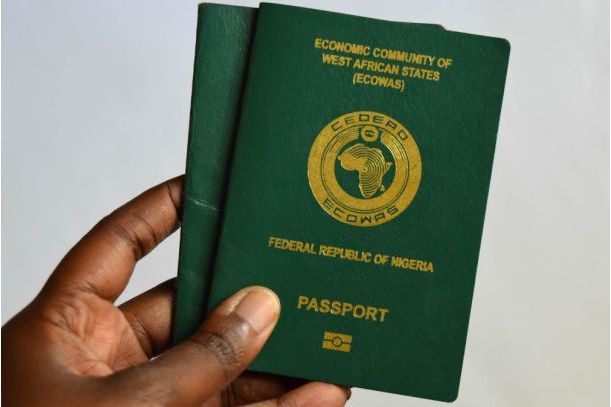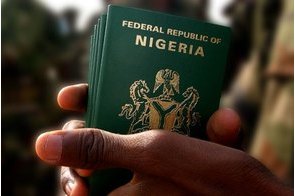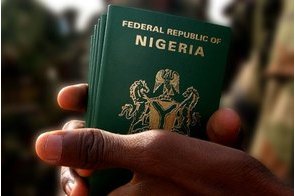Latest News
Nigeria maintains 95th position on Passport Power 2020 index

News Highlight
No emerging- or advanced-market economies is among the 46 countries Nigerian passport holders can travel to without prior visa in 2020.
For the second year running, Nigeria has ranked 95th position on the Henley Passport Index, which ranks all the world’s passports according to the number of destinations their holders can access without a prior visa. A total of 107 countries are ranked on the 2020 index.
This year, Nigerian passport holders will be able to travel to 46 countries without a visa, prior to their arrival. 28 out of the countries are in Africa. And 20 out of the 46 countries will issue visa on arrival to Nigerian passport holders. No emerging- or advanced-market economies is among the 46 countries Nigerian passport holders can travel to without prior visa in 2020.
In 2006, Nigeria ranked 62nd on the index. But the country’s position continued to worsen after that, reaching 87th in 2012. In 2015, the country dropped to its lowest position (95th) on the index. After slightly better rankings, 92nd in 2016, 91st in 2017 and 94th in 2018, Nigeria dropped back to the 95th position in 2019.
The best ranked African countries are Mauritius, South Africa and Botswana, ranked 32nd, 56th, and 62nd, respectively. Mauritius has visa-free arrival in 146 countries; South Africa, 100 countries; and Botswana, 84 countries. Other African countries that rank above Nigeria on the 2020 index include Namibia, Kenya, Ghana and Uganda.
In December 2019, President Buhari announced that there would be visa-free arrival in Nigeria for all African countries, from January 2020. Those who need a visa can apply on arrival. But without reciprocity, Nigeria is unable to expand the number of countries that Nigerian passport holders can arrive without prior visa.
Asian countries have firmly established their lead on the Henley Passport Index. For the third consecutive year, Japan secured the top spot on the index — which is based on exclusive data from the International Air Transport Association (IATA) — with a visa-free/visa-on-arrival score of 191.
Singapore holds onto its 2nd-place position with a score of 190, while South Korea drops down a rank to 3rd place alongside Germany, giving their passport holders visa-free/visa-on-arrival access to 189 destinations worldwide.
The US and the UK continue their downward trajectory on the index’s rankings. While both countries remain in the top 10, their shared 8th-place position is a significant decline from the number one spot they jointly held in 2015. Elsewhere in the top 10, Finland and Italy share 4th place, with a score of 188, while Denmark, Luxembourg, and Spain together hold 5th place, with a score of 187.
The index’s historic success story remains the steady ascent of the UAE, which has climbed a remarkable 47 places over the past 10 years and now sits in 18th place, with a visa-free/visa-on-arrival score of 171. On the other end of the travel freedom spectrum, Afghanistan remains at the bottom of the index, with its nationals only able to visit a mere 26 destinations visa-free.
Christian H. Kaelin, Chairman of Henley & Partners and the inventor of the passport index concept, says the latest ranking provides a fascinating insight into a rapidly changing world. “Asian countries’ dominance of the top spots is a clear argument for the benefits of open-door policies and the introduction of mutually beneficial trade agreements. Over the past few years, we have seen the world adapt to mobility as a permanent condition of global life. The latest rankings show that the countries that embrace this reality are thriving, with their citizens enjoying ever-increasing passport power and the array of benefits that come with it.”
As ongoing research shows, these benefits are extensive. Using exclusive historical data from the Henley Passport Index, political science researchers Uğur Altundal and Ömer Zarpli, of Syracuse University and the University of Pittsburgh, respectively, have found that there is a strongly positive correlation between travel freedom and other kinds of liberties – from the economic to the political, and even individual or human freedoms.
Altundal and Zarpli observe that “there’s a distinct correlation between visa freedom and investment freedom, for instance. Similar to trade freedom, countries that rank highly in investment freedom generally have stronger passports. European states such as Austria, Malta, and Switzerland clearly show that countries with a business-friendly environment tend to score highly when it comes to passport power. Likewise, by using the Human Freedom Index, we found a strong correlation between personal freedom and travel freedom.”
While the latest results from the Henley Passport Index show that globally, people are more mobile than ever before, they also indicate a growing divide when it comes to travel freedom, with Japanese passport holders able to access 165 more destinations around the world than Afghan nationals, for example. Analysis of historical data from the index reveals that this extraordinary global mobility gap is the starkest it has been since the index’s inception in 2006.
The impact of these and other key developments is analysed in depth in the 2020 edition of the Henley Passport Index and Global Mobility Report — a unique publication that offers cutting-edge analysis and commentary from leading scholars and professional experts on the latest trends shaping international and regional mobility patterns today.
Commenting in the report, Dr. Parag Khanna, bestselling author and the Founder and Managing Partner of FutureMap in Singapore, notes: “Migration, as with almost everything else, is a function of supply and demand — and, increasingly, it is accepted that more migration creates more demand, stimulating much needed economic growth. As the world economy heads into a synchronized slowdown, we must view migration as part of the solution, not the problem.”
Khanna points out that with the US-China trade war showing no signs of decelerating, Western investment has shifted out of China towards Southeast Asia, bringing a new wave of foreign talent into ASEAN countries that have encouraged greater migration through streamlined visa policies. Thailand’s strong upward movement in the Henley Passport Index’s rankings over the past year is a clear illustration of this emerging trend; benefitting from mutually reciprocal visa waivers, the country has climbed three spots in the past year and now sits in 65th place, with a visa-free/visa-on-arrival score of 78.
Middle Eastern countries have also made strong gains as part of overall efforts to boost trade and tourism. The UAE and Saudi Arabia each climbed four places, while Oman climbed three. Saudi Arabia is now in 66th place, with citizens able to access 77 destinations around the world without a prior visa, while Oman sits in 64th place, with a visa-free/visa-on-arrival score of 79.
Related News
Latest Blogs
- What Ould Tah’s tenure at BADEA reveals about his AfDB candidacy
- Implementation strategy crucial for the success of 12-4 education policy
- A senator’s suspension threatens the right of representation
- Tinubu’s promising revolution in infrastructure development
- Has Tinubu’s economic reform started working?
Most Popular News
- Artificial intelligence can help to reduce youth unemployment in Africa – ...
- Nigeria records $6.83 billion balance of payments surplus in 2024
- Tariffs stir inflation fears in US but offer targeted industry gains ...
- Tinubu appoints new Board Chair, Group CEO for NNPC Limited
- Soaring civil unrest worries companies and insurers, says Allianz
- CBN net reserve hits $23.1 billion, the highest in three years








